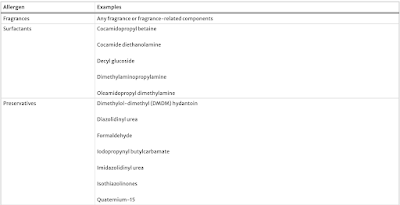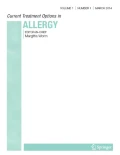Abstract
Purpose of Review
Atopic dermatitis (AD) or eczema is a frequent chronic inflammatory skin disease. Taking care of the eczematous skin is important to reduce the inflammation and return it to a healthier looking nourished skin. Beyond recommending topical anti-inflammatory drugs and the use of emollients, recommendations on the correct use of other everyday skin products, as cleansers or make-up products, are lacking.
Recent Findings
 |
| Potential allergens that can be found in cleansers and make-up removers |
Summary
Guiding healthcare professionals on the composition of the cosmetics used, avoiding products with high allergenic properties, identifying products that follow the principles of “hurdle technology,” and educating patients on the appropriate use of make-up and cleansing products have a positive impact on the care of atopic dermatitis and should be part of a holistic approach to a patient.
Key messages
- Adverse reactions to cosmetics can come from allergic sensitization or irritant stimuli (like the rubbing associated with washing the skin).
- Optimizing the composition of the cosmetics used is essential. Ideally, the patients should distinguish the multiple components of a cosmetic, identifying potential risks.
- Avoid products with high allergenic properties, like fragrances or preservatives. Select products which follow the principles of “hurdle technology”: sterile cosmetic technology, good manufacturing practices, appropriate packaging, emulsion form, water activity, and pH control.
- Appropriate use of make-up is important for better care and quality of life of AD patients. Guidance on their use and appropriate cleansing products and techniques are essential to prevent exacerbations.

No comments:
Post a Comment